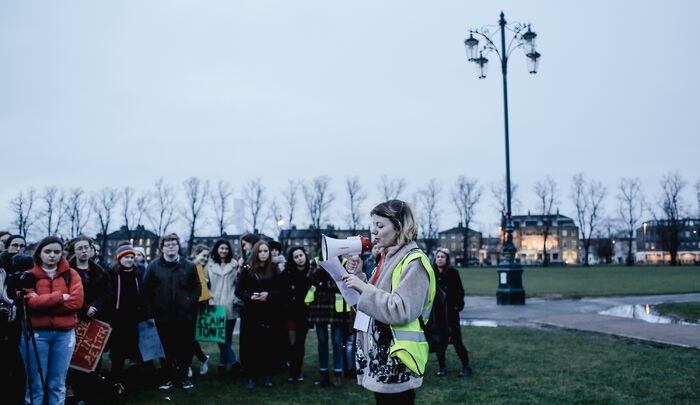Ayesha Hazarika says women’s rights should not be considered “a luxury”
Ahead of her Cambridge show, Eoin McSweeney speaks to Ayesha Hazarika about the ongoing fight for women’s rights over their bodies

Content note: the following article contains discussion relating to sexual harassment and assault
“Living in such a period of mad politics, having a sense of humour and being able to do comedy is kind of like therapy. It’s saving me a lot in psychology fees.” Ayesha Hazarika is anything but conventional. Her career as a comedian started when she was persuaded by her friends to take up stand-up comedy – while working as a press office at the Department of Trade and Industry.
Comedy then took a back seat when Ayesha returned to politics as she focused on developing her career as a political advisor to senior Labour politicians, including Ed Miliband. When I asked her about what motivated her to shift between the two, she said it was down to her insatiable appetite for both. “I loved working in politics, I’m a complete geek – I think it’s fascinating. I got to do some amazing and really fulfilling things. Having said that, there is no better feeling than making a room full of people laugh.”
She will be at the Cambridge Junction tomorrow night, Friday October 19th, with her new show Girl on Girl – The Fight for Feminism. The show is an examination of recent feminist struggles, laced with both humour and scathing honesty. A clip of Donald Trump telling reporters that this is a “scary and difficult time for young men” in light of the Kavanaugh allegations comes to mind, and I suggest that it would probably draw the biggest laugh of the evening if she were to play it for the audience. She chuckled and responded with a barrage of vitriol for the US President. “Trump is trying to engage in a culture war; I was not surprised by his comments. It’s not difficult for young men if you treat women properly.”
“Women are in a position for the first time where they can speak about things that have happened to them. Secrecy protected men and it allowed them to get away with abuses of power – that veil of secrecy has been lifted.”
The #MeToo movement started last year in an attempt to demonstrate the sexual abuse epidemic in Hollywood and beyond, in response to the allegations levelled at Harvey Weinstein. Since then a bombardment of accusations have been levelled at powerful men in multiple industries. This in turn led to the creation of the Time’s Up Legal Defence Fund, which has raised millions of dollars to support women seeking legal assistance in fighting sexual abuse, assault or harassment in the workplace.
However, recent developments have led many to question the real effect of #MeToo. The appointment of Brett Kavanaugh to the US Supreme Court and Trump’s subsequent comments, along with the high profile Ulster Rugby rape trial in Belfast this year, are enough to make anyone question whether real, long-lasting impact has been made. The key to change is action, not just words, and many now wonder whether the initial hype of #MeToo has died down. I posed these thoughts to Ayesha. Her quiet contemplation before answering was a telling indicator of her thoughts on the matter.
“The answer is yes and no. Women are in a position for the first time where they can speak about things that have happened to them. Secrecy protected men and it allowed them to get away with abuses of power – that veil of secrecy has been lifted.” She continues: “[However,] it has not provided all the answers, and we have a long way to go. #MeToo is only a year old when you think of where we are as a civilisation, but we shouldn’t kid ourselves. You have to make a change through politics.”
We shift to speaking about women’s reproductive rights in light of the success of the Repeal the Eighth movement in the Republic of Ireland. The removal of the amendment to the constitution which for thirty-five years had afforded the same rights to the unborn child as to the mother was no doubt incredible progress; however, one only has to look across the border to see that Northern Irish women are now not afforded the same right as their Southern counterparts. On this matter Ayesha issues a damning indictment of the DUP’s Brexit policy, criticising them for wanting to remain as British as possible - except when it comes to rights for women and LGBTQ people.
She is adamant that women everywhere must have full agency over their own bodies. “It’s really important to think that women’s rights are human rights and [remember] they should apply to women all over the world. It’s not a gift or a luxury, it’s a right to choose what to do with your body and not feel unsafe.”
As we wrapped up our conversation, I asked Ayesha her plans for the rest of the year and next – to which she replied that her major plan was to finally take a holiday! Describing herself as a political animal, she went on to say that she won’t rule out going back into politics, but that she has a whole new interesting life now which she is enjoying. I look forward to laughing with this enigmatic, intelligent and hilarious woman on Friday.
If you have been affected by any of the issues raised in this article, the following organisations provide support and resources:
 News / Cambridge welcomes UK rejoining the Erasmus scheme20 December 2025
News / Cambridge welcomes UK rejoining the Erasmus scheme20 December 2025 News / CUP announces funding scheme for under-represented academics19 December 2025
News / CUP announces funding scheme for under-represented academics19 December 2025 News / News in Brief: humanoid chatbots, holiday specials, and harmonious scholarships21 December 2025
News / News in Brief: humanoid chatbots, holiday specials, and harmonious scholarships21 December 2025 News / SU reluctantly registers controversial women’s soc18 December 2025
News / SU reluctantly registers controversial women’s soc18 December 2025 News / King appoints Peterhouse chaplain to Westminster Abbey22 December 2025
News / King appoints Peterhouse chaplain to Westminster Abbey22 December 2025









